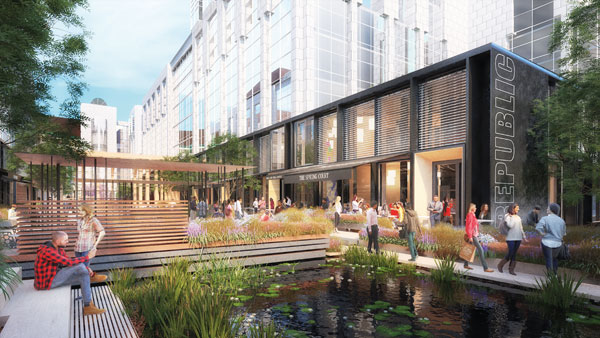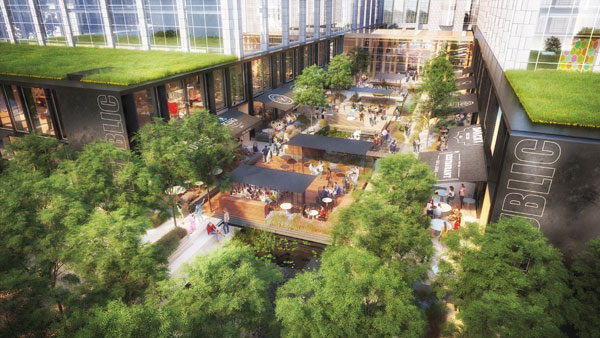Regenerating communities and delivering returns

|
Written By: Alan Tripp |
Alan Tripp of Lasalle outlines a case study showing how the proposed pooling structure in the LGPS could open up opportunities that benefit investors and communities alike
Last year the then UK Chancellor, George Osborne, asked the 89 Local Government Pension Funds in England and Wales (LGPS) to group together to form six British “Wealth Funds” of pooled assets. The aim was to achieve the benefits of scale, establish strong governance and decision-making, reduction of costs and an improved capacity to invest in infrastructure. Following the pools’ final submissions to the government in July this year, eight pools emerged ranging in size from £13 billion to £36 billion. This scale means that the schemes will be able to target larger property investments. Republic at East India Dock in London is an interesting example of how large investments have the potential to deliver excellent returns whilst playing a key role in regenerating communities. This typifies our approach to identifying locations with superior long-term growth prospects.
In 2015, LaSalle, in partnership with Trilogy Property Advisers, acquired a prominent 6.4-acre site in the London Docklands for £170 million, with a commitment to invest a further £70 million. Together, we are in the process of refurbishing the site as a viable alternative for occupiers priced out of traditional office locations. High quality office space will be provided at competitive rents (mid-£30 per square foot) with superior amenities to support the new workforce. The acquisition represented an exceptional opportunity to create a vibrant new business quarter in a well-connected part of London. It is in the heart of an area undergoing a significant transformation with new residential development and the impending introduction of Crossrail drawing people to the neighbourhood, all of which supports the new vision for the site. The acquisition brought together a club of five like-minded clients with similar time horizons for investment.
Entrance to the Republic
Property, pooling and the benefits of scale
Pension funds have long recognised the positive attributes that property brings to a multi-asset class portfolio. These include high and stable income generation, inflation-matching characteristics, diversification through modest correlation with other asset classes and attractive risk-adjusted returns. Traditionally, institutions investing in commercial property have focused on the amount that they ought to have in offices, shops and industrial, using MSCI/IPD indices as proxies for the UK property market. This can result in a degree of short-term index-hugging at the expense of a longer-term perspective. In turn, this can detract from the goals of investors with longer time horizons, such as pension funds.
In relation to real estate, the benefits of scale and a long-term investment horizon are pertinent criteria for local authority pension schemes at a time when they are pooling their assets and will be able to target larger investments in a wider investment universe. It has always been LaSalle’s belief that scale can introduce greater efficiencies; the Government’s pooling proposal is aligned with our belief that portfolios can be more effectively managed with fewer, larger assets. We believe that smaller pension funds in particular will benefit in being pooled as they will have access to greater expertise, lower costs and greater diversification. There is also likely to be a switch away from fund-of-funds investing towards direct investment, especially in the UK. Investing as part of a pool will mean they can consider more large-scale investments. However, because of their scale, such projects require a long-term vision and specialist ongoing management skills.
Investing for the long-term
At LaSalle, we have developed a fundamentals-based approach to identifying the factors that will ensure locations and buildings will deliver long-term income and value growth. This has been a move away from starting with index weightings as a primary driver of an investment strategy. We call this approach DTU-investing. It involves identifying locations that will benefit from changing demographics and technology needs and the trend towards urbanisation. Changing demographic trends include the impact of the millennial “work, live, play” generation, the ageing of populations, changing consumer preferences, and growing workforce mobility. Our approach avoids investing in locations which are fashionable but not sustainable and that could suffer from volatile demand for property. It also means we look through cycles and periods of uncertainty, and invest for the long-term, confident that demand for a location will grow.
One way to access DTU-rich opportunities is through large urban regeneration or redevelopment projects. Republic encapsulates all three of our DTU criteria. It is located close to public transport but equally importantly is on the technology data highway. As such it is one of the best technologically connected locations in London, which means Republic achieves a platinum Wired-score; this certifies that it is best-in-class across all features of connectivity that matter most to occupiers.
Prior to our acquisition, the offices were being used as disaster recovery space for businesses that were located elsewhere. This meant that no-one occupied the buildings, adding little to the local community. Located in one of the fastest growing areas in the UK, which is already benefitting from changing demographics and the impact of tech on demand for contemporary workspace, Republic will quickly meet this growing demand by providing competitively priced space, appealing to occupiers looking for a stimulating work and lifestyle environment in London.
Republic is also illustrative of the blurred lines between property and infrastructure. This is particularly relevant given one of the key goals of the pooling initiative is to improve the local authority pension funds’ capacity to invest in infrastructure. The definition of infrastructure agreed by the Cross Pool Collaboration Group (Infrastructure Sub-Group) is the “facilities and structures needed for the functioning of communities and to support economic development.” As the “Central Pool” notes in its final submission to the Government on their proposed pooling plans, “conventional commercial property is not normally included [in the definition of infrastructure], but where it forms part of a broader infrastructure asset, helps urban regeneration or serves societal needs it may be.” Republic fits squarely into this definition.
Aerial view of Republic
Good for the community and good for investors
It is crucial for us to work with the Local Borough Council in delivering something that will have a positive impact on the local community, helping to support its key priorities of job generation and provision of affordable housing. Republic will create jobs and amenities, such as restaurants and cafes, as well as some retail. However, this is being delivered in a way that is complementary to the existing local high street and leisure provision. This has meant close co-operation with local planners to ensure the retail we are putting in is what is needed to support the office uses and attract jobs to the area.
Creating a sense of place and improvements to the public realm and amenities are key to regenerating the location. This involves improving the environment, which the scale of the site allows us to do, along with providing good quality flexible and sustainable office space that attracts occupiers. This means far more green space, making better use of existing water features – everything to make the environment a more pleasant place to be in. Where possible we are trying to re-use what is already there and are very focused on sustainability. While Republic will be a great place to work, we are also seeking to make it a great place to “be” and we will be targeting WELL Building standards, an evidence-based system for measuring, certifying and monitoring the performance of building features that impact health and well-being. All of this will maximise net operating income in the short-term and set the foundations for value growth in the long-term. This is both good for the community and good for investors.
More Related Content...
|
|
|

